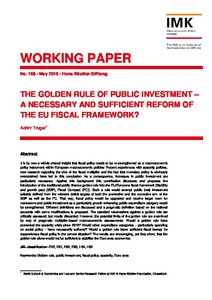The golden rule of public investment - a necessary and sufficient reform of the EU fiscal framework?
"It is by now a widely shared insight that fiscal policy needs to be re-strengthened as a macroeconomic policy instrument within European macroeconomic policies: Recent experiences with austerity policies, new research regarding the size of the fiscal multiplier and the fact that monetary polic...
| Main Author: | |
|---|---|
| Institution: | ETUI-European Trade Union Institute |
| Format: | TEXT |
| Language: | English |
| Published: |
Düsseldorf
2016
IMK |
| Subjects: | |
| Online Access: | https://www.labourline.org/KENTIKA-19103640124919218229-The-golden-rule-of-public-inve.htm |
| Summary: | "It is by now a widely shared insight that fiscal policy needs to be re-strengthened as a macroeconomic policy instrument within European macroeconomic policies: Recent experiences with austerity policies, new research regarding the size of the fiscal multiplier and the fact that monetary policy is obviously overstrained have led to this conclusion. As a consequence, increases in public investment are particularly necessary. Against this background this contribution discusses and proposes the introduction of the traditional public finance golden rule into the EU/Eurozone fiscal framework (Stability and growth pact (SGP), Fiscal Compact (FC)). Such a rule would exempt public (net) investment suitably defined from the relevant deficit targets of both the preventive and the corrective arm of the SGP as well as the FC. That way, fiscal policy would be upgraded and receive larger room for manoeuvre and public investment as a particularly growth enhancing public expenditure category would be strengthened. Different definitions are discussed and a pragmatic definition based on the national accounts with some modifications is proposed. The standard reservations against a golden rule are critically assessed, but mostly discarded. However, the potential limits of the golden rule are examined by way of pragmatic multiplier-based macroeconomic assessments: Would a golden rule have prevented the austerity crisis since 2010? Would other expenditure categories - particularly spending on social policy - have necessarily suffered? Would a golden rule leave sufficient fiscal leeway for expansionary fiscal policy in the current situation? The results are encouraging, yet they show, that the golden rule alone would not be sufficient to stabilise the Euro area economies." |
|---|---|
| Physical Description: | 49 p. Digital |

